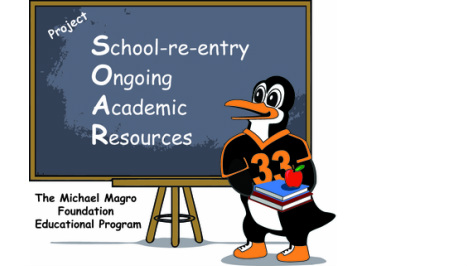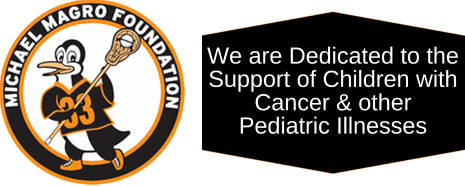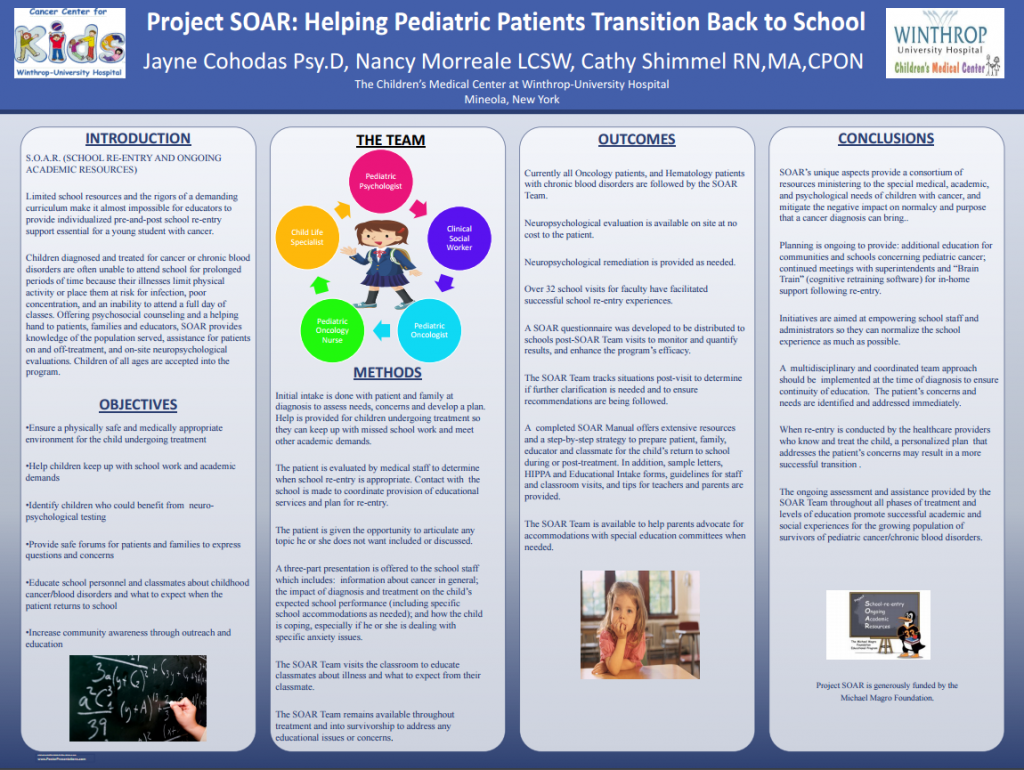Project Soar

View the 2019-2020 Stewardship Report for Project SOAR
Project SOAR (School re-entry and Ongoing Academic Resources): School is a world that belongs to children. When cancer takes them away from that world, CCFK’s skilled psychosocial team shepherds its patients on their journey back to the classroom with compassionate care and a collaborative approach to healing. Project SOAR, funded by the Michael Magro Foundation, is designed to increase each child’s chances for a successful academic experience during treatment for his or her disease, and for years after treatment has ended. For children to thrive in the classroom, they not only need a smooth transition or “re-entry,” but they often require ongoing assistance, sometimes through their college years. Project SOAR nurtures the pediatric cancer patient, the family, and the academic community, empowering the success of their collaborative efforts.
SOAR demystifies cancer for everyone, which is why the project is so vital to the success of pediatric patients with cancer and blood diseases. It is important to allow these children, who are already at a disadvantage because of their illness, to be able to feel as normal as possible. A parent is required to sign a HIPAA form before SOAR contacts the school, and federal guidelines are followed rigorously. Read the full story here.
The Impact
Patient Stories
A neuropsychological evaluation was conducted on a 19-year-old male diagnosed with an undifferentiated malignant soft tissue sarcoma of the chest wall. He was referred for an evaluation because he was struggling to complete tests in a timely fashion and was concerned that this struggle would interfere with his ability to perform to the best of his ability on the SAT. As a result of an evaluation conducted in September of 2011, he received testing accommodations for the SAT and in college. In college, this male is a pre-med major and reports that the accommodations have helped to achieve a 3.2 GPA for his freshman year.
A neuropsychological evaluation was conducted on a 5-year-old female diagnosed with Acute Lymphoblastic Leukemia. She was referred for an evaluation because her parents were concerned about her fine motor skills and ability to maintain her attention. As a result of an evaluation conducted in June of 2012, she receives Occupational Therapy in school to help with a fine motor development weakness. Her mother reports that her fine motor skills continue to develop and strengthen as a result of these services.
An 8-year-old male diagnosed with Acute Lymphoblastic Leukemia was referred for a follow-up neuropsychological evaluation because his parents had concerns regarding his ability to maintain his attention and to clarify whether he was on the Autism Spectrum. As a result of an evaluation conducted in January of 2013, a diagnosis of Autistic Disorder was determined, and therefore, he will continue to receive special education services and classroom and testing accommodations. Furthermore, more specialized interventions tailored for children diagnosed with Autistic Disorder such as social groups are now available to this child.
Testimonial
Division of Pediatric Hematology/Oncology
The Cancer Center for “Kids” Winthrop University Hospital
To Whom It May Concern:
I would like to take a moment to acknowledge and, on behalf of my colleagues, share my appreciation for the efforts of your “care team” at The Cancer Center for “Kids.” When we heard the news that one of our beloved kindergarten students was diagnosed in early 2014, we, at the school, needed much guidance in how to proceed in a way that would most appropriately support this student, her family, her peers, and school staff on a most difficult journey that was about to ensue. To our rescue came the staff at Winthrop, namely Brianne Gruber, Nancy Morreale, and Kim Krupa. They have been a tremendous support on every level imaginable from day one, including team visits to the classrooms for presentations for teachers and students, psycho-educational assessments and feedback (a personal thank-you to Brianne), recommendations for classroom accommodations, and reports on medical status along the way, to name just a few. The best report of all came this school year when we were informed that our now second grade student was doing well enough to be able to stop her chemo treatment. The smiles from everyone haven’t stopped since.
Please keep up the great work you’re all doing!
Sincerely yours,
Ralph DiFiore
School Psychologist
Maurice W. Downing Primary School





